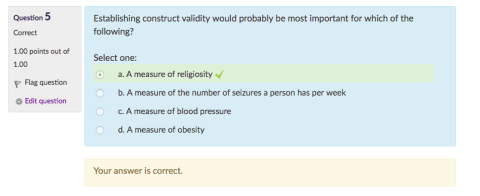PEDAGOGICAL OBJECTIVE
The Moodle Quiz can be used for much more than a traditional assessment. It can be an effective tool to help students develop as self-regulated1 learners when dealing with course material. Faculty can also design Moodle quizzes to verify student learning without assigning grades. The results can be used to gauge where to focus in-class teaching time.
academic technology tool
The Moodle Quiz can be used to create quiz with questions of different types: multiple choice, true/false, matching, etc.
Featured Faculty:
Image

Elizabeth Aries

Description
In Psychology 123: Research Methods of Spring 2019, Professor Aries used Moodle to share each week’s key terms and concepts. She then created a quiz based on that material. The quizzes were open-book and the quiz was set to allow students to take it twice. Prof. Aries observed that more than 80% of the students in that course retook the the quiz, and most scored almost 100% on the second attempt.

Professor Aries credits Dr. Riley Caldwell O’Keefe, (Director, Center for Teaching and Learning) for helping to design this simple and effective technique of open-book quiz-taking with two attempts.

Quiz settings to allow multiple attempts
This practice had a positive impact on teaching and learning: students could assess (and improve) their own learning, and Professor Aries could see how well the students understood the concepts. She then knew which topics needed the most attention in class and could focus on these (versus lecturing on every concept). Professor Aries noticed that this practice also improved class discussions, since students came prepared, and it provided digital scaffolding by linking information on concepts to quizzes and class discussions.
Accessibility Bonus
For students, making the quizzes low-stakes, open-book, and flexible in the number of attempts helped to allay anxiety. Where appropriate, untimed assignments eliminate the need for time-based testing accommodations. This practice also creates transparency in terms of class expectations, benefitting all learners.
How to...
1 Panadero, E. (2017). A review of self-regulated learning: six models and four directions for research. Frontiers in psychology, 8, 422.
Published Spring 2020 by Academic Technology Services